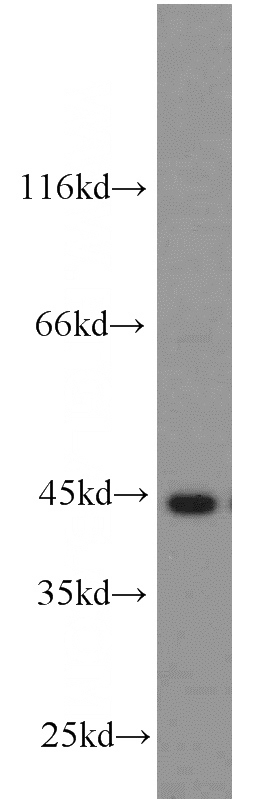-
Product Name
ACADM antibody
- Documents
-
Description
ACADM Rabbit Polyclonal antibody. Positive WB detected in mouse liver tissue, HEK-293 cells, HepG2 cells, K-562 cells, mouse heart tissue, rat heart tissue. Positive IHC detected in human liver tissue, human heart tissue. Observed molecular weight by Western-blot: 45kd
-
Tested applications
ELISA, WB, IHC
-
Species reactivity
Human,Mouse,Rat; other species not tested.
-
Alternative names
ACAD1 antibody; ACADM antibody; FLJ18227 antibody; FLJ93013 antibody; FLJ99884 antibody; MCAD antibody; MCADH antibody
-
Isotype
Rabbit IgG
-
Preparation
This antibody was obtained by immunization of Peptide (Accession Number: NM_000016). Purification method: Antigen affinity purified.
-
Clonality
Polyclonal
-
Formulation
PBS with 0.02% sodium azide and 50% glycerol pH 7.3.
-
Storage instructions
Store at -20℃. DO NOT ALIQUOT
-
Applications
Recommended Dilution:
WB: 1:500-1:5000
IHC: 1:20-1:200
-
Validations

mouse liver tissue were subjected to SDS PAGE followed by western blot with Catalog No:107720(ACADM antibody) at dilution of 1:500
-
Background
ACADM, also named as MCAD, belongs to the acyl-CoA dehydrogenase family. This enzyme is specific for acyl chain lengths of 4 to 16. It catalyzes the reaction: Acyl-CoA + acceptor = 2,3-dehydroacyl-CoA + reduced acceptor. Defects in ACADM are the cause of medium-chain acyl-CoA dehydrogenase deficiency (MCAD deficiency). This protein can exsit as a dimer(PMID:8962055). This antibody is specific to ACADM.
-
References
- Huang D, Li T, Li X. HIF-1-mediated suppression of acyl-CoA dehydrogenases and fatty acid oxidation is critical for cancer progression. Cell reports. 8(6):1930-42. 2014.
- Dong D, Qi Y, Xu L. Total saponins from Rosa laevigata Michx fruit attenuates hepatic steatosis induced by high-fat diet in rats. Food & function. 5(12):3065-75. 2014.
- Liu M, Xu L, Yin L. Potent effects of dioscin against obesity in mice. Scientific reports. 5:7973. 2015.
- Fang M, Fan Z, Tian W. HDAC4 mediates IFN-γ induced disruption of energy expenditure-related gene expression by repressing SIRT1 transcription in skeletal muscle cells. Biochimica et biophysica acta. 1859(2):294-305. 2016.
- Xu T, Zheng L, Xu L. Protective effects of dioscin against alcohol-induced liver injury. Archives of toxicology. 88(3):739-53. 2014.
- Li S, Zhou T, Li C. High metastaticgastric and breast cancer cells consume oleic acid in an AMPK dependent manner. PloS one. 9(5):e97330. 2014.
Related Products / Services
Please note: All products are "FOR RESEARCH USE ONLY AND ARE NOT INTENDED FOR DIAGNOSTIC OR THERAPEUTIC USE"
